InterManager Asks IMO to Send the Bill for Carbon Costs to Shipowners

As the IMO closes in on global regulations for shipping's carbon emissions, professional shipmanagement firms are concerned that the language could have unintended effects on third-party managers.
According to industry organization InterManager, the current proposed text that will be reviewed at MEPC83 improperly accounts for the role of shipmanagement firms. About 20 percent of all merchant ships have a third-party ISM manager - not the owner, nor the commercial manager, but purely a technical manager. Since a third-party manager has no say in the commercial operations of the ship, nor in its construction or bunker fuel selection, it should not be held legally responsible for the ship's emissions, according to InterManager.
"In comparison to the charterer and shipowner, the ship manager has no material influence over the GHG intensity of a ship. Ship managers have no say regarding the type of engine powering the managed ship, nor whether sails, solar, fuel cells or other installations are installed on board. Such choices are decided exclusively by the shipowner," the association said in a statement.
InterManager's proposed text would state that the entity responsible for compliance would be "the registered owner of the ship." This would put the financial burden on the shipowner, not the manager; the shipmanager would still be tasked with collecting emissions data and reporting it properly, in accordance with regulations.
"We ship managers are fully committed to playing our part in shipping’s journey to net zero. However, when it comes to the GHG intensity of a ship, ship managers have no say whatsoever in any of the decisions that result in material impact; they are not even consulted. In shore terms, we are the facility managers, not the factory owners," said InterManager President Sebastian von Hardenberg. "In taking our points into consideration, the IMO can develop a more practical and equitable framework."
The association's objections mirror a long debate around who should be responsible for compliance with the EU's greenhouse gas rules for shipping. The newly-imposed FuelEU Maritime regulation places compliance responsibility upon the ship's technical manager; if the technical manager is a third party, it must work out contractual arrangements with the shipowner and charterer to protect its financial interests.
By contrast, the EU Emissions Trading Scheme puts responsibility on the registered shipowner by default. If the ship is chartered out or managed by a third party, the shipowner must work out contractual arrangements for compliance costs with the charterer or technical manager.
